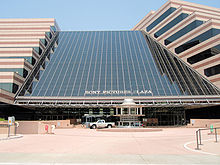
Back اختراق سوني بيكتشرز انترتينمنت Arabic ھاککردنی سۆنی پیکچەرز ئینتەرتەینمنت CKB Ciberataque a Sony Pictures de 2014 Spanish Sony Pictures Entertainmenten aurkako zibererasoa Basque Piratage de Sony Pictures Entertainment French מתקפת ההאקרים על סרטי סוני HE Սոնիի նկարների կոտրելը Armenian ソニー・ピクチャーズ・エンタテインメントへのハッキング事件 Japanese 소니 픽처스 엔터테인먼트 해킹 사건 Korean Cyberaanval op Sony Pictures Entertainment Dutch

On November 24, 2014, the hacker group "Guardians of Peace" leaked confidential data from the film studio Sony Pictures Entertainment (SPE). The data included employee emails, personal and family information, executive salaries, then-unreleased films, future film plans, screenplays, and other information.[1] The perpetrators then employed a variant of the Shamoon wiper malware to erase Sony's computer infrastructure.[2]
During the hack, the group demanded that Sony withdraw its then-upcoming film The Interview, starring James Franco as a reporter and Seth Rogen (who also wrote, produced, and directed the film alongside his creative partner Evan Goldberg) as his producer who are hired by the United States and South Korean governments to set up an interview with North Korean leader Kim Jong-un as part of a plot to assassinate him, and threatened terrorist attacks at cinemas screening the film. After many major U.S. theater chains opted not to screen The Interview in response to these threats, Sony chose to cancel the film's formal premiere and mainstream release, opting to skip directly to a downloadable digital release followed by a limited theatrical release the next day.[3][4][5]
United States intelligence officials, after evaluating the software, techniques, and network sources used in the hack, concluded that the attack was sponsored by the government of North Korea, which has since denied all responsibility.[6] Some independent cybersecurity experts doubt the involvement of North Korea.[citation needed]
- ^ Siboni, Gabi; Siman-Tov, David (December 23, 2014). Cyberspace Extortion: North Korea versus the United States (PDF) (Report). INSS. Archived (PDF) from the original on August 20, 2016. Retrieved March 23, 2023.
- ^ Zetter, Kim (February 24, 2016). "The Sony Hackers Were Causing Mayhem Years Before They Hit the Company". Wired. Archived from the original on March 12, 2017. Retrieved March 23, 2023.
- ^ "Sony Pictures Entertainment Notice Letter" (PDF). State of California Department of Justice Office of the Attorney General. December 8, 2014. Archived (PDF) from the original on February 12, 2015. Retrieved December 20, 2014.
- ^ Feeney, Nolan (December 16, 2014). "Sony Asks Media to Stop Covering Hacked Emails". Time. Archived from the original on July 23, 2016. Retrieved December 17, 2014.
- ^ Weise, Elizabeth (December 17, 2014). "Experts: Sony hackers 'have crossed the line'". USA Today. Archived from the original on December 17, 2014. Retrieved December 17, 2014.
- ^ Cite error: The named reference
nyt-linkedtokoreawas invoked but never defined (see the help page).